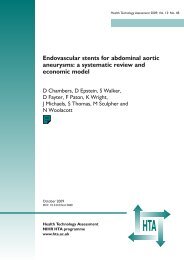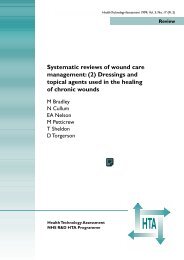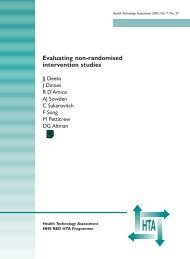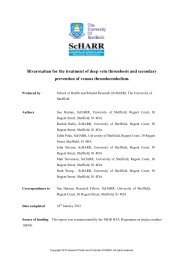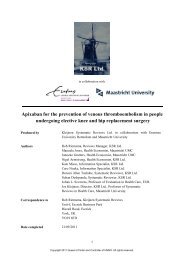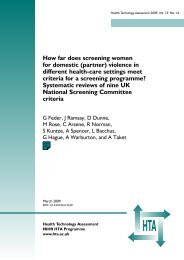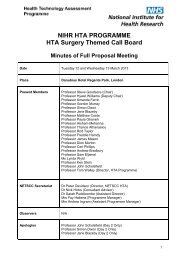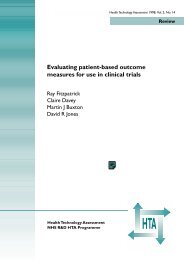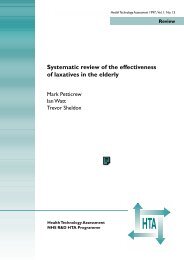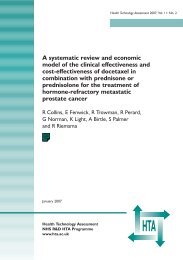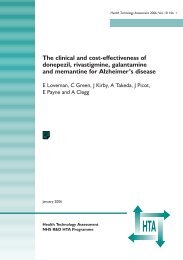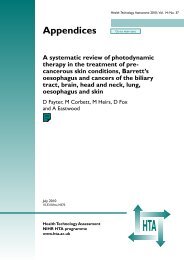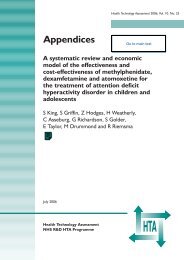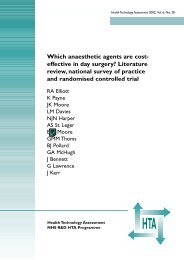A systematic review and economic model of the effectiveness and ...
A systematic review and economic model of the effectiveness and ...
A systematic review and economic model of the effectiveness and ...
You also want an ePaper? Increase the reach of your titles
YUMPU automatically turns print PDFs into web optimized ePapers that Google loves.
76<br />
Clinical <strong>effectiveness</strong><br />
quality assessment, <strong>and</strong> <strong>the</strong> results should be<br />
interpreted with caution.<br />
ATX versus placebo<br />
Generally, <strong>the</strong>re was consistent evidence that ATX<br />
was superior to placebo for hyperactivity <strong>and</strong><br />
CGI. 63,73–75,89 No studies compared ATX with nondrug<br />
treatment. Two <strong>of</strong> <strong>the</strong>se studies were deemed<br />
to be <strong>of</strong> good quality (based on <strong>the</strong> reporting <strong>of</strong><br />
<strong>the</strong> study methodology) <strong>and</strong> <strong>the</strong>ir results are likely<br />
to be reliable. 73,89 [Confidential information from<br />
one study that examined hyperactivity <strong>and</strong> CGI<br />
removed].<br />
IR-MPH versus ER-MPH<br />
Of <strong>the</strong> studies that evaluated IR-MPH compared<br />
with ER-MPH, no differences were reported for<br />
hyperactivity 55,97 or CGI. 97 However, <strong>the</strong>se two<br />
studies scored poorly in <strong>the</strong> quality assessment,<br />
<strong>and</strong> <strong>the</strong> results should be interpreted with caution.<br />
[Confidential information from two studies that<br />
reported on CGI removed].<br />
MPH versus DEX<br />
The results <strong>of</strong> comparisons between MPH <strong>and</strong><br />
DEX were variable. One study reported that MPH<br />
(medium dose) was superior to DEX (low dose)<br />
when assessed using Conners’ teacher-rated scales,<br />
but not for Conners’ parent-rated scales. 50<br />
Ano<strong>the</strong>r study observed no differences between<br />
MPH (medium dose) <strong>and</strong> DEX (medium dose) for<br />
hyperactivity. 37 CGI was not assessed in ei<strong>the</strong>r<br />
study. The study that evaluated medium-dose<br />
MPH compared with medium-dose DEX rated<br />
well in <strong>the</strong> quality assessment, whereas <strong>the</strong> o<strong>the</strong>r<br />
did not score very well, <strong>and</strong> any results should be<br />
interpreted with caution.<br />
MPH versus ATX<br />
Very few studies compared MPH <strong>and</strong> ATX. One<br />
reported no difference between <strong>the</strong> two drugs for<br />
hyperactivity or CGI. 70 This study did not<br />
adequately report study methodology, <strong>and</strong> <strong>the</strong><br />
results should be interpreted with caution.<br />
[Confidential information from one study that<br />
evaluated ER-MPH with ATX on hyperactivity<br />
<strong>and</strong> CGI removed].<br />
ATX versus DEX<br />
No studies compared ATX versus DEX.<br />
Summary <strong>of</strong> adverse events data<br />
MPH versus placebo<br />
Primary studies<br />
Amongst studies that compared low-dose MPH<br />
with placebo, no differences in adverse events were<br />
detected between <strong>the</strong> treatment groups. 55,60<br />
However, amongst studies that compared mediumor<br />
high-dose MPH with placebo, <strong>the</strong>re was<br />
evidence that treatment was associated with higher<br />
incidences <strong>of</strong> headaches, loss <strong>of</strong> appetite, stomach<br />
ache <strong>and</strong> insomnia compared with<br />
placebo. 35,39,44,46,57,60,66–68,83,91,95 [Confidential<br />
information from one study that examined<br />
adverse events removed].<br />
None <strong>of</strong> <strong>the</strong> studies examining MPH (any dose)<br />
combined with a non-drug intervention compared<br />
with placebo presented adverse events data<br />
informative to our analysis.<br />
Of <strong>the</strong> studies comparing ER-MPH (any dose) with<br />
placebo, treatment was associated with decreased<br />
appetite <strong>and</strong> increased insomnia amongst<br />
participants. 32,55,59,92,97 [Confidential information<br />
from one study that examined adverse events<br />
removed].<br />
None <strong>of</strong> <strong>the</strong> studies comparing MPH (any dose)<br />
alone with a non-drug intervention reported<br />
adequate data on adverse events.<br />
Amongst <strong>the</strong> trials comparing MPH in<br />
combination with a non-drug intervention with a<br />
non-drug intervention alone, <strong>the</strong> majority did not<br />
report differences in adverse events between<br />
treatment groups. 51,77,78,80–82,88<br />
Of <strong>the</strong> studies comparing ER-MPH plus non-drug<br />
intervention with a non-drug intervention alone,<br />
<strong>the</strong> medium-dose study reported that loss <strong>of</strong><br />
appetite was significantly greater in <strong>the</strong> combined<br />
treatment group. 82<br />
Systematic <strong>review</strong>s<br />
Only one SR met <strong>the</strong> inclusion criteria for our<br />
analysis <strong>of</strong> adverse events; 114 this reported on<br />
studies assessing MPH treatment. The majority <strong>of</strong><br />
<strong>the</strong> included studies that examined weight<br />
detected differences between treatment arms or<br />
baseline <strong>and</strong> active drug conditions. Fewer studies<br />
found effects on height, <strong>and</strong> some initial<br />
differences were no longer significant at long-term<br />
follow-up. Approximately half <strong>of</strong> <strong>the</strong> studies<br />
evaluating heart rate or blood pressure detected<br />
differences between treatment arms or baseline<br />
<strong>and</strong> active drug conditions. Loss <strong>of</strong> appetite, sleep<br />
disturbances, dizziness, headaches <strong>and</strong> stomach<br />
aches were <strong>the</strong> most commonly reported somatic<br />
complaints. The authors concluded that adverse<br />
events related to growth <strong>and</strong> cardiovascular<br />
outcomes were predominantly transient in nature,



